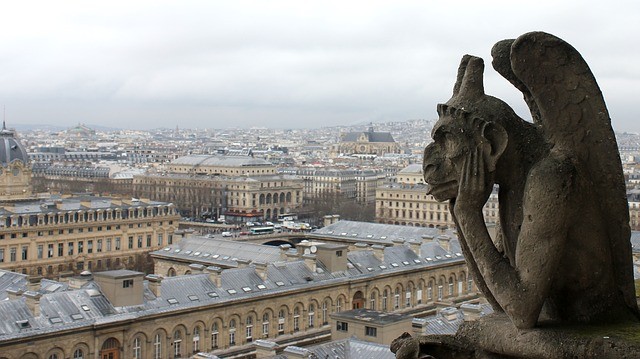- Home
- About Us
- The Team / Contact Us
- Books and Resources
- Privacy Policy
- Nonprofit Employer of Choice Award

 The recent fire at Notre Dame cathedral and lightning fast fundraising effort have caused many in the charity sector to wonder what we can learn from this. AFP International gathered an all-star panel for their thoughts.
The recent fire at Notre Dame cathedral and lightning fast fundraising effort have caused many in the charity sector to wonder what we can learn from this. AFP International gathered an all-star panel for their thoughts.
Simone Joyaux noted that fundraising has our first psychologist, Dr. Jen Shang, who provided expert commentary on the Notre Dame fire on the BBC. She commented that the fire touched people in making them connect to national pride and national identity. Shang also mentioned that people were referring to Notre Dame as "her" or "she" and that helped personalize the event.
Joyaux also commented that this fire evoked the concept of instantaneousness. The fire happened and we watched it happen. It grabbed us immediately. The fire was something out of the ordinary - this is what evokes a response. Many of the key reasons why people give to charity are why they gave to this cause. She referenced Jeff Brooks' blog as an excellent summary of these reasons including a situation where it is believable that money can solve this problem, loss aversion, and we experienced it together as a community.
Tycely Williams noted that motivations for giving to Notre Dame fit with research on donor motivations. Notre Dame represents a trusted institution and research finds that people are more likely to give when they think their money will be well spent. Interestingly, people tend to give from altruism which usually is found in giving to others. It is usually more difficult to build a case for a building. This event shows people love, and have a tie to, places as well as people.
Dave Tinker pointed out that in the Seven Faces of Philanthropy, Russ Alan Price noted that religious conviction is a key reason why people give. Trust is key in most parts of life and a revered institution enjoys great trust.
Joyaux noted that people give through organizations to fulfill their own aspirations. That cause is the means to fulfill that aspiration. She also commented that we should not be disrespectful about choices other people make to charity.
Building on that point, Williams commented we should not tell people where to give, instead focusing on encouraging people to give to voluntary action in whatever form speaks to them. She remarked that France's three wealthiest families gave and asked if that encouraged others to join in?
Dave Tinker replied that having the wealthiest families contribute made people feel that the project was worthy since they assume that the project is strong. He added that traditionally we ask the larger donors first in a capital campaign.
The panel also gave advice for organizations today. Williams noted that charities can use disasters as a leverage opportunity to raise money in your local community. An opportunity to show how we need to support what we cherish. For example, a charity with an aging building could use this moment. Joyaux noted that the fire raises the question of making sure you have good gift acceptance policies in place before disaster hits.
Finally, Tinker shared that the charity his community served in Pittsburgh had been hurt by the synagogue shootings. Two of the clients of the charity where he works, David and Cecil, had been killed. The charity started a campaign called "Love like the boys" to giive a chance for people to do some "random act of kindness" so that they could honour the men without giving cash.
Notre Dame was one disaster. In an era where we are seeing more natural disasters and human-made ones, the lessons from this event will help us all to do our work better.
References
Jeff Brooks Why they donate to Notre Dame and not your cause.
Sara Konrath Ph.D. Six reasons why people give their money away, or not
Russ Alan Prince Seven Faces of Philanthropy
Love like the Boys Facebook campaign
Simone Joyaux, ACFRE, AdvDip, FAFP, is described as “one of the most thoughtful, inspirational, and provocative leaders in the philanthropic sector worldwide.” She’s a consultant specializing in fund development, strategic planning, and board development. Simone speaks worldwide, regularly serves on boards, and has written three books and contributed to multiple others.
David Tinker, MPA, MISST, CFRE, FAFP, is vice president of advancement at ACHIEVA and an adjunct professor of informatics in Muskingum University's Master of Information Strategy, Systems & Technology program. An AFP Master Trainer, he received the Outstanding Fundraising Executive Award from the AFP Western Pennsylvania Chapter in 2013. In 2017, he was honored as part of the inaugural class of Distinguished Fellows of AFP.
Tycely Williams, CFRE, has inspired individuals and institutions to invest more than $84 million in charitable causes. Currently, she serves as vice president of development for YWCA USA and chair of AFP’s Women’s Impact Initiative (WII). Over the past 20 years, Tycely has advanced philanthropy at the American Red Cross, the YMCA of Metropolitan Washington, and four human services organizations. She is a past president of the AFP DC Chapter.
Ann Rosenfield, MBA, CFRE did this summary while eating lunch. Any errors are due to the scribe taking a bite of tuna at the wrong moment and do not reflect the wisdom of the panel.